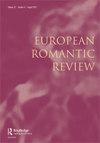华兹华斯的网络:旋转生态挽歌
IF 0.1
0 HUMANITIES, MULTIDISCIPLINARY
引用次数: 0
摘要
本文考察了华兹华斯笔下的两个纠结场景:《荒废的小屋》中挂在废弃水井上的蜘蛛网和《牧歌兄弟》中无人居住的房间里的“织网”。这两个网站都显示了华兹华斯对18世纪90年代末兴起的生态纠缠理论的关注,以及华兹华斯对生态学和挽歌的实验性编织。华兹华斯的两位代悼词者,小贩和牧师,用网来追踪自然对人类悲伤和死亡的微妙而积极的反应。我展示了两位挽歌家是如何开发不同的挽歌工艺来测试不同版本的生态挽歌的。他们通过各自不同的诗学,思考挽歌如何融入生态知识,生态如何重塑过去的挽歌习俗,以及哀悼本身如何与自然纠缠。他们的实验使华兹华斯得以探索悲情、诗歌和生态之间密切但不稳定的联系。本文章由计算机程序翻译,如有差异,请以英文原文为准。
Wordsworth’s Webs: Spinning the Ecological Elegy
ABSTRACT This article investigates two sites of Wordsworthian entanglement: the spider’s web across the abandoned well in “The Ruined Cottage” and the “web spun” in a neglected room in “The Brothers, A Pastoral Poem.” Both webs show Wordsworth’s attention to a theory of ecological entanglement that was emerging in the late 1790s, and more: Wordsworth’s experimental weaving of ecology and elegy. Wordsworth’s two surrogate elegists, the Pedlar and the Priest, use webs to track the subtle but active ways in which nature reacts to human grief and death. I show how both elegists develop distinct elegiac crafts to test different versions of the ecological elegy. Through their divergent poetics, they consider how elegy can incorporate ecological knowledge, how ecology reshapes past elegiac conventions, and how mourning itself becomes entangled in nature. Together their experiments allow Wordsworth to probe the close but precarious alliances between pathos, poetry, and ecology.
求助全文
通过发布文献求助,成功后即可免费获取论文全文。
去求助
来源期刊

European Romantic Review
HUMANITIES, MULTIDISCIPLINARY-
CiteScore
0.30
自引率
50.00%
发文量
61
期刊介绍:
The European Romantic Review publishes innovative scholarship on the literature and culture of Europe, Great Britain and the Americas during the period 1760-1840. Topics range from the scientific and psychological interests of German and English authors through the political and social reverberations of the French Revolution to the philosophical and ecological implications of Anglo-American nature writing. Selected papers from the annual conference of the North American Society for the Study of Romanticism appear in one of the five issues published each year.
 求助内容:
求助内容: 应助结果提醒方式:
应助结果提醒方式:


